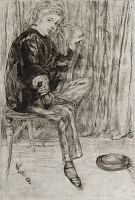Etchings Institutions search term: south kensington museum
Arthur Haden | ||
| Number: | 66 | |
| Date: | 1859 | |
| Medium: | drypoint | |
| Size: | 229 x 154 mm | |
| Signed: | 'Whistler.' (2-final) at lower left | |
| Inscribed: | '1869' at lower left (2-3); changed to '1859' (4) | |
| Set/Publication: | 'Cancelled Plates', 1879 | |
| No. of States: | 4 | |
| Known impressions: | 31 | |
| Catalogues: | K.61; M.61; T.59; W.47 | |
| Impressions taken from this plate (31) | ||

The copper plate bears the rectangular stamp of 'HUGHES & KIMBER / MANUFACTURERS/ RED LION SQUARE / FLEET STREET / LONDON'. The same stamp appears on three Thames plates of 1859 of the same size, Thames Police
[53], Stevens' Boat Yard
[56], Black Lion Wharf
[54] and several portraits, all of 1859-1860. 7
In 1872 an exhibition at the opening of the Guildhall Library and Museum of engraved portraits from the collection of James Anderson Rose (1819-1890) included portraits by Whistler, described as 'Nine portraits etched in copper - very rare - plates destroyed'. 8 Candidates for these nine portraits include Auguste Delâtre, Printer [28], Whistler with a hat [44], C. L. Drouet, Sculptor [35], Finette [61], Z. Astruc, Editor of 'L'Artiste' [36], Arthur Haden [66], Mr Mann [73], Riault (The Wood Engraver) [69] and Axenfeld [68]. Other possibilities include Greenwich Pensioner [40], Bibi Valentin [34], Bibi Lalouette [33] and Fumette, Standing [59].
In 1872 an exhibition at the opening of the Guildhall Library and Museum of engraved portraits from the collection of James Anderson Rose (1819-1890) included portraits by Whistler, described as 'Nine portraits etched in copper - very rare - plates destroyed'. 8 Candidates for these nine portraits include Auguste Delâtre, Printer [28], Whistler with a hat [44], C. L. Drouet, Sculptor [35], Finette [61], Z. Astruc, Editor of 'L'Artiste' [36], Arthur Haden [66], Mr Mann [73], Riault (The Wood Engraver) [69] and Axenfeld [68]. Other possibilities include Greenwich Pensioner [40], Bibi Valentin [34], Bibi Lalouette [33] and Fumette, Standing [59].
The plate was certainly cancelled by the time of Whistler's bankruptcy. It was cancelled with numerous horizontal, diagonal and zigzag lines across the figure. The cancelled plate was probably among those bought at Whistler's bankruptcy sale by the Fine Art Society, London. It was published in an album of Cancelled Plates ('Cancelled Set') by The Fine Art Society, London, 1879.
The plate was bought by Charles Lang Freer (1856-1919) in 1890. It was bequeathed to the Freer Gallery of Art in 1919.
The plate was bought by Charles Lang Freer (1856-1919) in 1890. It was bequeathed to the Freer Gallery of Art in 1919.
